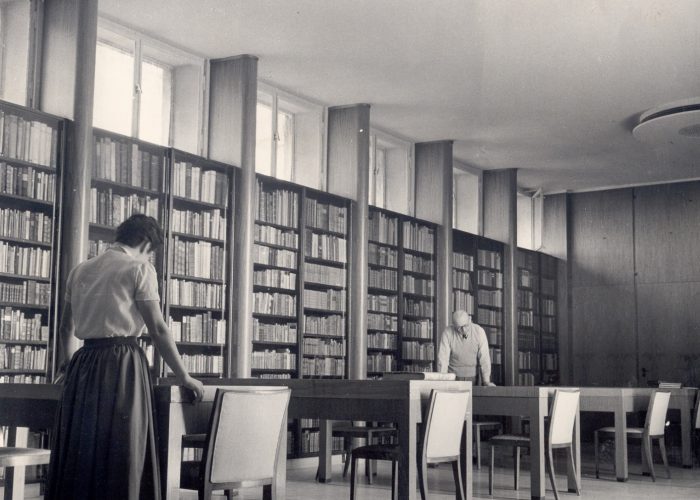Bibliophile
Schocken was a lifelong, passionate bibliophile who could not resist accumulating books even as a poor and struggling teenager. His harsh work experience as a young apprentice instilled in Schocken a strong interest in social activism and worker movements, leading him to purchase books on socialism in cheap pamphlet editions. This was the seed of what later became one of his pet collection projects — a unique archive of twenty-three different editions of Marx and Engel’s Communist Manifesto.
Schocken had a lifelong fascination with the German poets Goethe and Heine. He was inspired by Goethe’s fictional character Wilhelm Meister, a young man struggling to escape the empty life of a bourgeois businessman. In Heine, he saw a role model of an intellectual who contributed greatly to European culture while being proud of his Jewish roots.
Seeing himself as an autodidact in the Meister tradition, Schocken acquired and read books feverishly. His collection of German romantic manuscripts and first editions included works by Goethe, Nietzsche, Heine, Brentano, Eichendorff, Hölderlin, Paul, von Kleist, Novalis and the Schlegel brothers. Among his prized possessions were Goethe’s handwritten sketches to Faust II, and the final pages of his autobiography, Dichtung und Wahrheit.
In addition to being fully immersed in German culture, Schocken’s interest in Judaism ran deep, but was strictly secular. The first Hebrew book he owned was an 1843 edition of the Book of Hosea, received as a Bar Mitzvah gift. As a young man, he was impressed by the Jewish enlightenment movement, and collected books by the philosopher Moses Mendelssohn.
In 1906, Schocken read Martin Buber’s Tales of Rabbi Nachman. Buber’s neo-Hasidic style impressed Schocken deeply, germinating into a lifelong drive to help usher a Jewish cultural renaissance by giving a modern interpretation to ancient Jewish literary treasures. His collection of Rabbi Nachman’s print editions is the most comprehensive in the world. Schocken was particularly interested in efforts to revive the ancient Hebrew language. He financed many revival projects, e.g. translations of medieval Spanish-Hebrew poetry into German and Hebrew, and made them accessible to contemporary readers.
Schocken once described how his “life within the world of German literature needed the supplement” of connecting to a rich Hebrew heritage. When Schocken died in his sleep in a hotel room in 1959, he was found with Goethe’s book Faust firmly clutched in his hand. The only other book in the room was Martin Buber’s The Stories of Rabbi Nachman, exquisitely bound and published by Schocken Verlag in Berlin.
